
"The Israel Lobby":
Harvard version (very large PDF file)
London Review of Books version (HTML)
www.thornwalker.com/ditch/snieg_lobby_left.htm

"The Israel Lobby":
Harvard version (very
large PDF file)
London Review of Books version
(HTML)
Israel-lobby
denial:
The bankruptcy of the mainstream Left
as illustrated by Stephen Zunes,
– or, – On the issue of the Israel lobby
the Left is no more courageous than anyone else
By STEPHEN J. SNIEGOSKI
| If you find this essay of value, please send a donation of $4 to TLD. More information appears below. |
The antiwar Left would prefer that old-style American imperialism and the quest for oil had caused the Iraq War. They are the preferred enemies of the Left. They are the traditional villains. And they are safe villains. Mentioning Israel as a culprit would cause problems: it would lose support for the Left among activist Jews, and it would lead to hostility from the Israel lobby and mainstream Jewish groups.
By way of contrast, no one ever got in trouble berating oil magnates or Arab sheiks — witness Michael Moore's blockbuster 2004 documentary, "Fahrenheit 9/11," which focuses on those alleged villains while ignoring the neocon/Israel connection to the war. [1] Also important is the fact that Jews, categorically, are considered to be victims; and it is hard for the Left to criticize an officially recognized victim group. In terms of left-wing psychology the ideal is to strike a radical, nonconformist pose without really alienating the powerful, thus avoiding any negative consequences as well as the cognitive dissonance that results from chiding designated victims. The process can go so far as to turn a man into an unintentional apologist for Israel. Such is the case with Stephen Zunes, a prominent leftist historian of the Middle East, whom the leftist Israel-critic Jeffrey Blankfort describes as a Noam Chomsky acolyte. [2]
Zunes teaches at the University of San Francisco and, as his biography at the USF Website indicates, serves as a writer and Middle East editor for the Foreign Policy in Focus Project, and as an associate editor for Peace Review. [3] Zunes has given numerous lectures and conference papers in the United States and abroad, and has published numerous articles in journals, magazines, and newspapers on such topics as U.S. foreign policy, Middle Eastern political developments, African politics, social movements, and nonviolent action. His books include Nonviolent Social Movements (Blackwell, 1999) and, with Richard Falk, Tinderbox: U.S. Foreign Policy and the Roots of Terrorism (Common Courage, 2003). Zunes has served as a political analyst for National Public Radio, Pacifica Radio, the BBC, and MSNBC. He has also been a board member and consultant for a number of peace and human-rights organizations. As is apparent from this brief description, Zunes is a prominent intellectual activist of the antiwar Left. And his views reflect the characteristic attitude of that broad group.
Writing in Foreign Policy in Focus, Zunes recently offered an
analysis [4] of John
Mearsheimer and Stephen Walt's "Israel Lobby" essay [5] that
was similar in some ways to the negative views of leftist luminaries Chomsky
and Norman Finkelstein [6] but reflected a more hostile
tone not just toward Mearsheimer and Walt but toward anyone who would dare
claim that the Israel lobby has had an impact on American foreign
policy.
To encapsulate Zunes's position: Instead of influencing American policy, Israel is but the passive instrument of American policymakers. Washington has forced Israel to pursue a belligerent policy to enhance American hegemony in the Middle East for the benefit of corporate capitalists, especially arms merchants. Free of American control, Israel would pursue a peaceful policy toward the Palestinians and neighboring Arab states. Therefore, Israel is the victim of the United States.
Moreover, Zunes maintains, those who claim a significant role for Israel and the Israel lobby in determining U.S. foreign policy tend toward anti-Semitism. Thus does the left-wing critic of American policy morph into an apologist for Israel. Like Alan Dershowitz — in some respects worse than Dershowitz — Zunes makes use of misleading half-truths while simultaneously ignoring the unmistakable evidence substantiating the power of the Israel lobby in influencing U.S. policy.
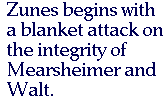 Zunes begins his essay with a blanket attack on the integrity of Mearsheimer and
Walt. While Chomsky at least praised the courage of the two scholars, Zunes sees a
devious intent behind their work. "What progressive supporters of Mearsheimer
and Walt's analysis seem to ignore," Zunes asserts, "is that both men have a vested
interest in absolving from responsibility the foreign policy establishment that they
have served so loyally all these years. Israel and its supporters are
essentially being used as convenient scapegoats for America's disastrous
policies in the Middle East." [7]
Zunes begins his essay with a blanket attack on the integrity of Mearsheimer and
Walt. While Chomsky at least praised the courage of the two scholars, Zunes sees a
devious intent behind their work. "What progressive supporters of Mearsheimer
and Walt's analysis seem to ignore," Zunes asserts, "is that both men have a vested
interest in absolving from responsibility the foreign policy establishment that they
have served so loyally all these years. Israel and its supporters are
essentially being used as convenient scapegoats for America's disastrous
policies in the Middle East." [7]
The presumption here is that anyone who does not identify with the Left somehow serves the foreign-policy establishment, in the manner of an employee or "lackey of American imperialism," as the Communist press used to put it. But the fact is that the two authors opposed the war on Iraq from the outset. They were among 33 academicians who took out an ad in the September 26, 2002, New York Times titled "War with Iraq Is Not in America's National Interest." That would be an odd way of serving the establishment, if said establishment actually directed the American war on Iraq, as Zunes categorically asserts. So let's just put this down as a gratuitous smear at best, not unlike what members of the Israel lobby hurled at Mearsheimer and Walt, along with anyone else who had the temerity to point out the lobby's power.
The idea that the Israel lobby was simply a scapegoat implies its innocence. But nowhere does Zunes try to show that its members, especially the neocons, were not pushing for war on Iraq or Iran. Instead, Zunes's defense is that the Israel lobby does not have the power to have its plans implemented or that it is merely a pawn of the United States.
He argues further that, because its members were divided on the issue, it cannot be
said that the Israel lobby
while Mearsheimer and Walt do not claim that the Israel lobby is monolithic or centrally directed, they fail to emphasize how not all pro-Israel groups support the policies of the Israeli government, particularly its right-wing administrations. Groups like Americans for Peace Now, the Tikkun Community, Brit Tzedek v' Shalom, and the Israel Policy Forum all identify themselves as pro-Israel but oppose the occupation, the settlements, the separation wall, and Washington's unconditional support for Israeli policies.But that argument ignores relative power. There is no Zionist peace group that counteracts the power of AIPAC. Similarly, there is no Zionist peace group that counters the neocons in terms of think tanks and media power.
Even more remarkably, Zunes denies the neocon role in the war. He charges that
perhaps the most twisted argument in [Mearsheimer and Walt's] article is the authors' claim that the 2003 invasion of Iraq "was motivated in good part by a desire to make Israel more secure." This is ludicrous on several grounds. First of all, Israel is far less secure as a result of the rise of Islamist extremism, terrorist groups, and Iranian influence in post-invasion Iraq than it was during the final years of Saddam Hussein's rule, when Iraq was no longer a strategic threat to Israel or actively involved in anti-Israeli terrorism.One may observe that this is perhaps the most twisted of Zunes's arguments (and there are many competitors). Even if his assumption were true that the war made Israel less secure (and that is highly questionable), it would have no bearing on the obvious fact that the Israeli government did actively urge the attack on Iraq; the Israelis did not merely go along with U.S. policy. Israel provided the bogus WMD intelligence to help garner the public and political support necessary to bring the war about. So in this case, as in many others, Zunes ignores not only facts but logic as well to infer that if Israel's security was not enhanced by the war, then Israel could not possibly have promoted such a policy in the first place. Such illogic would lead one to argue that Napoleon couldn't possibly have ordered the invasion of Russia, since it turned out to be a fiasco.
 As suggested above, it is anything but apparent that the war has harmed the
security of Israel. As a result of the war on terror, the United States is now
militantly opposed to the enemies of Israel, including the Palestinians. Israel has
now taken a free hand in dealing with the Palestinians. As a result of American
pressure, Syria removed its military from Lebanon. Now the United States and
Europe are pressuring Iran with respect to its nuclear policy — in essence we
see a
As suggested above, it is anything but apparent that the war has harmed the
security of Israel. As a result of the war on terror, the United States is now
militantly opposed to the enemies of Israel, including the Palestinians. Israel has
now taken a free hand in dealing with the Palestinians. As a result of American
pressure, Syria removed its military from Lebanon. Now the United States and
Europe are pressuring Iran with respect to its nuclear policy — in essence we
see a
Zunes also omits the fact that the neocons were the driving force for war and that their war agenda was closely linked to that of Israel. For some years before 2001, the neocons had
been pushing for war on Iraq, a war that was intended as the first step in
restructuring the entire Middle East — what they have referred to as World
As a result of neocon efforts, significant aspects of this destabilization plan,
developed to enhance Israeli security, became the policy of the United States in the
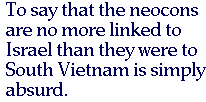 While not ignoring the neocons' actual plans, Zunes downplays their connection to
Israel. Zunes writes that "although the neoconservatives who championed the
invasion of Iraq were supporters of Israel's rightist governments, they had for
many years also been supporters of rightist governments in Latin America,
Southeast Asia, and elsewhere out of a belief that such alliances strengthened
American hegemony." To say that the neocons are no more linked to Israel than they
were to South Vietnam or Guatemala is simply absurd. Obviously, the neocons'
ties and loyalties have been far stronger to Israel than to any other country. On
this point I recommend to your attention my article "The second wave against
Mearsheimer and Walt: A well-tempered smother-out as a new war looms"
(The Last Ditch, May 25, 2006), especially my
discussion of some leading neocons and their Israeli ties. As I write in that
essay: "Neocons have been involved in institutions that promote the interests of
Jews and Israel — especially Commentary magazine, which is funded by the
American Jewish Committee, and the Jewish Institute of National Security
Affairs."
While not ignoring the neocons' actual plans, Zunes downplays their connection to
Israel. Zunes writes that "although the neoconservatives who championed the
invasion of Iraq were supporters of Israel's rightist governments, they had for
many years also been supporters of rightist governments in Latin America,
Southeast Asia, and elsewhere out of a belief that such alliances strengthened
American hegemony." To say that the neocons are no more linked to Israel than they
were to South Vietnam or Guatemala is simply absurd. Obviously, the neocons'
ties and loyalties have been far stronger to Israel than to any other country. On
this point I recommend to your attention my article "The second wave against
Mearsheimer and Walt: A well-tempered smother-out as a new war looms"
(The Last Ditch, May 25, 2006), especially my
discussion of some leading neocons and their Israeli ties. As I write in that
essay: "Neocons have been involved in institutions that promote the interests of
Jews and Israel — especially Commentary magazine, which is funded by the
American Jewish Committee, and the Jewish Institute of National Security
Affairs."
Neocons have argued that a strong America benefits Israel and Jewish interests. In
his sympathetic account of the neocons in The Neoconservative Revolution:
Jewish Intellectuals and the Shaping of Public Policy, Murray Friedman
writes: "A central element in [Norman] Podhoretz's evolving views [in the early
1970s], which would soon become his and many of the neocons'
governing principle was the question, 'Is It Good for the Jews,' the title of a
February 1972 Commentary piece." [8] Exemplifying the focus on
Jewish interests, Friedman observes that "Commentary articles now came to
emphasize threats to Jews and the safety and security of the
Jewish state. By the 1980s, nearly half of Podhoretz's writings on international
affairs centered on Israel and these dangers." [9]
Zunes asserts that groups other than the
Israel lobby — oil and the armaments industries — determine policy in
the Middle East: "More fundamentally, the United States has had strong strategic
interests in the Persian Gulf predating the establishment of modern Israel. Indeed,
oil companies and the arms industry exert far more economic and ideological
influence over Washington's policy in the Persian Gulf region than does the Israel
lobby." Here we have another half-truth. Undoubtedly, the United States has not
handed over American policy to the Israel lobby, or there would have been much
less support for catering to the goals of the oil-producing states —
necessitating, in part, the expression of some concern for the rights of the
Palestinians. However, if American foreign policy had always excluded the
interests of the Israel lobby, and that policy had simply rested in the hands of the State Department "Arabists" and the oil
industry, it is possible that Israel would never have come into being. [10] And it is a certainty that the
Palestinians' rights would have won greater recognition. In fact, concern for those
rights was actually demonstrated by the Carter and
As I point out in "Gulf
War 1991: Prefiguration and prelude to the 2003 Iraq debacle" (TLD,
February 18, 2005), between World
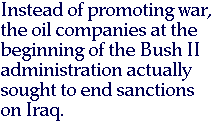 In the words of veteran neocon Michael Ledeen, "Creative
destruction is our middle name. We do it automatically.... It is time once again to
export the democratic revolution." [11] Whether the neocons
sincerely believe in establishing some version of democracy in the Middle East is
uncertain; in any case, the essential part of their definition of a democracy
is a government that supports Israel.
In the words of veteran neocon Michael Ledeen, "Creative
destruction is our middle name. We do it automatically.... It is time once again to
export the democratic revolution." [11] Whether the neocons
sincerely believe in establishing some version of democracy in the Middle East is
uncertain; in any case, the essential part of their definition of a democracy
is a government that supports Israel.
Let us note well that instead of
promoting war, the oil companies at the beginning of the
Zunes must confine his account of American policy in the Middle East to a hopelessly general level in order to conclude that the Israel lobby is unimportant. According to Zunes, the
claim that the Israel lobby is a major factor in the formulation of overall U.S. Middle East policy is plainly false. Indeed, U.S. policy in the Middle East over the past several decades — orchestrating military interventions and CIA-backed coups, backing right-wing dictatorships, peddling neoliberal economic policies through the International Monetary Fund and other international financial institutions, undermining the United Nations and international law, imposing sanctions against nationalist governments, etc. — is remarkably similar to U.S. policy toward Latin America, Africa, and Southeast Asia. If the United States can pursue such policies elsewhere in the world without pressure from the Israel lobby, why is its presence necessary to explain U.S. policies in the Middle East?Clearly, the United States has engaged and does engage in imperialistic activities that have nothing to do with Israel. But the question at hand is not why the United States pursues imperialism; rather, it is why the United States supports Israel. The operation of American imperialism does not ineluctably require promoting Israeli interests. In fact, it would be easy to see, and has in fact been observed, that U.S. support for Israel hinders U.S. policy in the Middle East by antagonizing the region's population and leaders, thus creating unnecessary enemies.
Zunes acknowledges the existence of establishment opposition to the war on Iraq but minimizes its significance. "Mearsheimer and Walt's observation that U.S. support of Israel runs contrary to U.S. strategic interests by stimulating anti-Americanism in the Arab/Islamic world is not an unprecedented dissenting position," Zunes writes. "During any administration, there are elements within establishment circles that come to conclusions challenging the prevailing mindset. For example, Mearsheimer and Walt joined Zbigniew Brzezinski, Jacek Krugler, and other realists who recognized that the invasion of Iraq was contrary to U.S. national security interests, but the Bush administration and a sizable majority of Congress (including the leadership of both parties) believed otherwise."
But in fact the opposition to the war on Iraq in establishment circles was far
greater than Zunes acknowledges and seems to have exceeded the actual support
for the war. No influential foreign-policy element, save the neocons, pushed for
war against Iraq and for the forcible restructuring of the Middle East. In "The second wave" I
point out that "leading elements 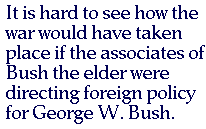 of the American security/foreign-policy
establishment — Bush the elder and his cronies, Brzezinski, foreign-policy
'realists,' liberal internationalists, the oil interests, global capitalists (e.g., George
Soros), the military brass, career State Department and CIA professionals —
were cool or hostile to the war on Iraq and the Middle East war agenda in
general." The mainstream media often cited such forces, as represented within the
Bush administration, as trying to restrain the neocon war effort. But that effort was directed by what Lawrence Wilkerson, former Secretary of State Colin Powell's chief of staff, terms the "cabal,"
which was able to bypass normal State Department channels. [13]
of the American security/foreign-policy
establishment — Bush the elder and his cronies, Brzezinski, foreign-policy
'realists,' liberal internationalists, the oil interests, global capitalists (e.g., George
Soros), the military brass, career State Department and CIA professionals —
were cool or hostile to the war on Iraq and the Middle East war agenda in
general." The mainstream media often cited such forces, as represented within the
Bush administration, as trying to restrain the neocon war effort. But that effort was directed by what Lawrence Wilkerson, former Secretary of State Colin Powell's chief of staff, terms the "cabal,"
which was able to bypass normal State Department channels. [13]
It is hard to see how the war would have taken place if the associates of Bush the elder — Brent Scowcroft, James Baker, Lawrence Eagleberger — were directing foreign policy for George W. Bush, as many commentators in 2000 had expected. The crucial importance of Bush's having neoconservative advisors was acknowledged by neocon Richard Perle:
If Bush had staffed his administration with a group of people selected by Brent Scowcroft and Jim Baker, which might well have happened, then it could have been different, because they would not have carried into it the ideas that the people who wound up in important positions brought to it. The ideas are only important as they reside in the minds of people who were involved directly in the decision process. [14]Zunes's implication that Congress is a definitive part of the foreign-policy elite distorts the very meaning of elite. Under Zunes's theory, any policy ever voted for by Congress would ipso facto represent an elite decision. Such a view would deny the role of lobbies, and it would deny the importance of the executive branch in shaping policy. Obviously, congressmen were influenced by the WMD propaganda spread by the administration; they either believed it themselves or believed that it was politically necessary to go along with the majority of their constituents who fell for it. Would Zunes argue that Congress would have voted for war if the executive branch had not been pushing its war propaganda? Impossible.
Zunes goes on to maintain that Israel has helped America to fight the "war on terror" presumably to advance American interests, writing:
The Pentagon pre-positions equipment in Israel to enhance military readiness for intervention elsewhere in the Middle East. Israel has also been supportive of U.S. military operations in Iraq by helping to train U.S. Special Forces in aggressive counterinsurgency techniques and sending urban warfare specialists to Fort Bragg to instruct assassination squads targeting suspected Iraqi guerrilla leaders. The U.S. civil administration in Iraq, established following the 2003 invasion, was modeled after Israel's civil administration in the occupied Arab territories following the 1967 Israeli invasion. U.S. officers have traveled to Israel and Israeli officers have traveled to Iraq for additional consulting. What's more, Israelis have helped arm and train pro-American Kurdish militias and have assisted U.S. officials in interrogation centers for suspected insurgents under detention near Baghdad. Israeli advisers have shared helpful tips on erecting and operating roadblocks and checkpoints, have provided training in mine-clearing and wall-breaching methods, and have suggested techniques for tracking suspected insurgents using drone aircraft. Israel has also provided aerial surveillance equipment, decoy drones, and armored construction equipment. In return, Israel has reaped ever-greater U.S. support.Undoubtedly, Israel has provided some help to the United States in the current war. But the question is to what extent it has helped, and how that help relates to the fact that Israel pushed for the war. Israel has shed little if any blood for this war. It has expended little treasure. Having promoted the war, it achieved its goal at virtually no cost. That is a diplomatic coup of major proportions. Israel's costs were especially infinitesimal compared with those of the United States in terms of treasure, blood, and diplomatic trade-offs. The United States has made enemies around the world, especially among the Islamic nations; Israel's enemies have remained the same.
Israeli activity in Kurdistan deserves a mention. There we should note that Israel is
simply advancing its own interests — to connect itself with an oil-producing
region that provides it a strategic location from which to put
pressure on both the Iraqi central government and Iran. [15] From the Likudnik
perspective, the reality of a fragmented Iraq was much to be preferred to the
neocons' mass-marketed pipe dream of a unified democratic Iraq. Such a division
of Iraq simply reflects the Israeli aim to fragment and destabilize its enemies, as
proposed in Yinon's 1982 article. Let us recall that in the past
past Israel has formed strong secret relationships with leaders of the Kurdish
secessionist movement. [16] What is not evident,
however, is how a destabilized and fragmented Iraq would benefit American
interests. Avoiding that very fragmentation was a fundamental reason Bush the elder
curtailed his invasion of Iraq in 1991; indeed, official American policy continues to favor a unified Iraq to the present day.
While the thrust of Zunes's thesis is to deny the power of the Israel lobby, he tacitly acknowledges that it possesses some power when he alludes to the "historic precedent ... for a wide bipartisan consensus of lawmakers myopically pursuing policies which end up hurting U.S. interests." He writes that "while the Israel lobby certainly contributes to this myopia through its distortions of the historical narrative and the current situation, there are plenty of other cultural, political, and related factors also at work." Certainly all historical events are multicausal. It is hard to think of any historical event that was caused by only one factor, independent of other underlying or contributing factors. Individuals or groups can achieve their goals only in certain environments.
Also overthrowing his premise of powerlessness, with respect to the lobby, is the homage that Zunes pays to reality by admitting that the Israel lobby does have the power to intimidate critics. But he couches that admission in a distorted manner. For example, he writes that the effort to suppress opposition comes from "organized right-wing forces," an odd description of such organizations as the Anti-Defamation League, which is quick to brand adversaries (especially those on the Right) with the lethal "anti-Semite" stigma.
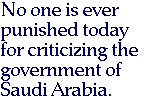 Furthermore, and strangely, Zunes asserts that attacks on critics of Israel or the
Israel lobby are no different from the attacks on those who criticize other American
policies, writing that "those who challenge U.S. policy anywhere are going to be
subjected to intimidation." But think back to the Vietnam War era. It was almost
Furthermore, and strangely, Zunes asserts that attacks on critics of Israel or the
Israel lobby are no different from the attacks on those who criticize other American
policies, writing that "those who challenge U.S. policy anywhere are going to be
subjected to intimidation." But think back to the Vietnam War era. It was almost
Continuing, Zunes reverses himself, in part, by admitting the "exceptional nature of the challenges faced by critics of U.S. support for the Israeli government." But after making that admission of inequivalency, Zunes then implies that such harsher treatment is to some extent understandable and largely the result of self-censorship rather than any external actions by the Israel lobby:
Given that Israel is the world's only Jewish state and that some criticism of Israel really is rooted in anti-Semitism, organized attacks against those opposing Israeli policies tend to carry more resonance since they involve alleged manifestations of prejudice against a minority group. If a Jewish state were not the focus, many liberals would dismiss such attacks as passé McCarthyism and would not take them seriously. As a result, assaults on critics of Israeli policies have been more successful in limiting open debate, but this gagging censorship effect stems more from ignorance and liberal guilt than from any all-powerful Israel lobby.That the censorship here "stems from ignorance and liberal guilt" rather than from the Israel lobby is highly questionable, for the proponents of Israel play a leading role in circulating disinformation and suppressing truth on the subject, keeping even educated people ignorant about the activities of Israel. Moreover, the lobby plays a role in generating guilt on selected issues advantageous to its interests — consider how the public is inundated by portrayals of the suffering in the Jewish Holocaust while the lobby simultaneously exerts its power to block portrayals of the Palestinian Nakba or any Israeli persecution of Palestinians. (The recent suppression of the play I Am Rachel Corrie in New York City is one example.)
Ignorance and guilt among American liberals are closely related to the power of the Israel lobby. And those not disabled by internal guilt understand that external punishments are always at hand: consider the cases of the brilliant writer Joe Sobran, fired from National Review and subsequently suffering in near-poverty as a result of the "anti-Semite" blacklist, and leading Middle East scholar Juan Cole, recently denied a tenured position at Yale. Those not motivated by guilt are kept in line by fear. Criticizing the Israel lobby will not, to be sure, lead one to be shot at sunrise or sent to the Gulag, but it can do irreparable harm to one's career.
Further militating against his powerlessness thesis, Zunes even acknowledges that the lobby generates fear. But he argues that it is an unwarranted fear: "The myth of an all-powerful Israel lobby is so pervasive that it has often scared off progressive funding and organizing that could conceivably challenge it." Zunes attributes the problem to the lobby's critics, writing that "exaggerating the power of the Israel lobby," as he claims Mearsheimer and Walt do, "leads to a self-fulfilling prophecy." But if, as Zunes's fundamental argument has it, the Israel lobby has no power to influence American policy and is simply a tool of the corporate elite, it is hard to see how any "self-fulfilling prophecy" could possibly occur. Whether the Israel lobby influenced American policy because of its actual power or because of people's irrational fear of its supposed power, the fact would remain that it could or did influence American policy — but the existence of that influence is denied by Zunes's overall thesis.
Having said that, I must add that
although the power of the Israel lobby is all too real, fear of it is often excessive. As
I pointed out in an earlier article, the Israel lobby is not
omnipotent, and Americans have the power to free themselves from its tentacles if
they are willing to eschew spineless acquiescence. [17]
Ironically, while Zunes denies that the Israel lobby has power, he is willing to attribute power to other lobbies; and by citing them he implies, willy nilly, that the Israel lobby, too, has some influence. He writes:
When examining the power of the Israel lobby in negatively influencing U.S. Middle East policy [which, remember, Zunes denies], it is important to recognize the role of other lobbies that have an interest in encouraging the dangerous direction of current U.S. policy. Placing so much emphasis on AIPAC and its allied groups ignores other special interests and ideologies which also play a role in urging U.S. support for the Israeli government.
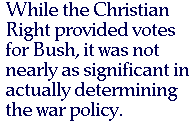 Zunes maintains that the "Christian Zionists exercise a much more influential role
in the current administration than do Jewish Zionists." But moving outside Zunes's
Alice-in-Wonderland cosmos, anyone can see that while the Christian Right
provided votes for Bush's election victories, it was not nearly as significant in
actually determining the war policy. The neocons not only designed the
Middle East plan that the Bush administration adapted but also played a major
role in promoting and implementing the policy. Consider the Bush neocon insiders:
David Wurmser, Douglas Feith, John Bolton, Elliot Abrams, Abram Shulsky, and, perhaps most important, Paul Wolfowitz,
whom Time Magazine called the "godfather of the Iraq war." [18] There were no members of
the Christian Right of comparable significance. The Christian Right only provided
the ground-level support for a policy that the neocons developed, implemented,
and promoted. And in 2002-2003, there was probably enough popular support for
the Bush policy without the Christian Right. It was necessary only that members of
the Christian Right should hold an opinion commensurate with other people of
their racial, sectional, and socio-economic status, in order to get the war policy
adopted by Congress.
Zunes maintains that the "Christian Zionists exercise a much more influential role
in the current administration than do Jewish Zionists." But moving outside Zunes's
Alice-in-Wonderland cosmos, anyone can see that while the Christian Right
provided votes for Bush's election victories, it was not nearly as significant in
actually determining the war policy. The neocons not only designed the
Middle East plan that the Bush administration adapted but also played a major
role in promoting and implementing the policy. Consider the Bush neocon insiders:
David Wurmser, Douglas Feith, John Bolton, Elliot Abrams, Abram Shulsky, and, perhaps most important, Paul Wolfowitz,
whom Time Magazine called the "godfather of the Iraq war." [18] There were no members of
the Christian Right of comparable significance. The Christian Right only provided
the ground-level support for a policy that the neocons developed, implemented,
and promoted. And in 2002-2003, there was probably enough popular support for
the Bush policy without the Christian Right. It was necessary only that members of
the Christian Right should hold an opinion commensurate with other people of
their racial, sectional, and socio-economic status, in order to get the war policy
adopted by Congress.Zunes contends that the most important lobby in regard to U.S. Middle East policy is the arms industry. "The military-industrial complex," he writes, "has a considerable stake in encouraging massive arms shipments to Israel and other Middle Eastern U.S. allies and can exert enormous pressure on members of Congress who do not support a weapons-proliferation agenda."
Undeniably, the arms industry is tied in with the Israel lobby, especially the neoconservatives. [19] But it is the latter who determine American policy. Many of their activities are right out in the open. They form an interlocking network of think tanks and organizations that produces a wide variety of materials to disseminate their positions; they appear in the major media; and they staff the executive branch. While some arms merchants and former military officers support the neocons, it is difficult to discern the hand of the military-industrial complex acting alone. Where are the arms industry's organizations and spokesmen that set policy? What influential individuals, organizations, and media outlets does the arms industry have comparable to Norman Podhoretz, Richard Perle, Douglas Feith, Paul Wolfowitz, Commentary, the Weekly Standard, the Jewish Institute of National Security Affairs, and the American Enterprise Institute?
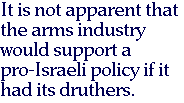 It is understandable that the arms industry supports Israel — and maintains
ties with Israel and its supporters — because it realizes that Israel's lobby is
very influential and sets the parameters for American Middle East policy, within
which other lobbies must operate. (Lobbyists tend to donate funds to winning
politicians, not to obvious losers who might be more sympathetic to their
particular interest.) It is not apparent that the arms industry would support a pro-Israeli policy if it had its druthers. If the arms industry could optimize American
foreign policy to serve its own interests, free of the impediment of the Israel lobby,
it could earn more profits by selling arms to Israel's enemies. Saddam, for
example, would have been willing to buy arms from the United States — and
in fact he did so during the 1980s. Iran, which currently has plenty of oil money, is
purchasing arms from other nations, especially China and Russia. The "war on
terror" has strained the U.S. relationship with Saudi Arabia, and that country, too, is now
purchasing arms from China.
It is understandable that the arms industry supports Israel — and maintains
ties with Israel and its supporters — because it realizes that Israel's lobby is
very influential and sets the parameters for American Middle East policy, within
which other lobbies must operate. (Lobbyists tend to donate funds to winning
politicians, not to obvious losers who might be more sympathetic to their
particular interest.) It is not apparent that the arms industry would support a pro-Israeli policy if it had its druthers. If the arms industry could optimize American
foreign policy to serve its own interests, free of the impediment of the Israel lobby,
it could earn more profits by selling arms to Israel's enemies. Saddam, for
example, would have been willing to buy arms from the United States — and
in fact he did so during the 1980s. Iran, which currently has plenty of oil money, is
purchasing arms from other nations, especially China and Russia. The "war on
terror" has strained the U.S. relationship with Saudi Arabia, and that country, too, is now
purchasing arms from China.
Unlike Israel, those countries purchase armaments with their own money, not with
military aid extracted from U.S. taxpayers. No doubt the United States could get
many countries in the world to purchase American arms if it provided them with
the funds to purchase them. In short, if the fundamental goal of American foreign
policy were to sell armaments, it is peculiar to propose that a pro-Israel foreign
policy would be essential. Similarly, if the goal were to enrich armament producers
by preparing for America's defense, there are plenty of potential adversaries
around the world to prepare to fight without focusing on those hostile to
Israel.
Ultimately, as signaled earlier in this essay, Zunes brandishes the anti-Semitic card:
There is something quite convenient and discomfortingly familiar about the tendency to blame an allegedly powerful and wealthy group of Jews for the overall direction of an increasingly controversial U.S. policy. Indeed, like exaggerated claims of Jewish power at other times in history, such an explanation absolves the real powerbrokers and assigns blame to convenient scapegoats. This is not to say that Mearsheimer, Walt, or anyone else who expresses concern about the power of the Israel lobby is an anti-Semite, but the way in which this exaggerated view of Jewish power parallels historic anti-Semitism should give us all pause.Just how long would Zunes have us pause? While he professes not to be labeling lobby critics as anti-Semites, he implies that they should not come out and openly express the view that the Israel lobby possesses power. Now, if the proponents of that view don't actually believe it, they shouldn't say it. Lying is bad. But if they do believe it, they should not shy away from telling the truth; they should not shy away from trying to discredit a policy that is resulting in the deaths of thousands of people and that portends to doom thousands more. They should persist despite any alleged negative implications from the past. Negative implications can probably be assigned to any idea. Let us not jail any minority-race criminals, for minority-race people were unfairly incarcerated and executed in the past; let us not criticize Arab states or Arab leaders, for the West's belief in their lack of enlightenment was used to justify Western imperialism in the past; let us not oppose poverty, for Communists opposed poverty; let us not indict American imperialism, for that was a common indictment by Communist propagandists; let us not decry smoking, for Hitler decried smoking.
Zunes goes so far as to claim that the idea of a powerful Israel lobby is widely voiced in private by diplomats and politicians seeking to avoid taking steps to aid the Palestinians or to justify their vote for arms funding for Israel. And he declares:
You still hear some peace and human rights activists quoting congressional aides and members of Congress as if these influential and (mostly) wealthy, white, Anglo-Saxon, Protestant lawmakers were actually helpless, innocent victims of a sinister cabal of rich and powerful Jews. Opposing inhumane Israeli policies is not anti-Semitic, but when those in positions of power utilize an exaggerated claim of Jewish clout in order to divert public attention from their own complicity with unpopular policies, they are indeed flirting with anti-Semitism.Zunes maintains, further, that the expression of that view by American officials increases anti-Semitism in the Arab world: "My interviews with a half dozen Arab foreign ministers and deputy foreign ministers in recent years have confirmed that U.S. diplomats routinely blame the 'Jewish lobby' as a means of diverting blame away from the U.S. government. This cynical excuse has contributed to the frightening rise in recent years of anti-Jewish attitudes in the Arab world."
But if such descriptions of the Israel lobby are merely maneuvers to divert
attention from real motives, why aren't they expressed in public? Wouldn't that be
more effective? If many people — including government officials — are
saying something in private but not in public, isn't it reasonable to conclude that
they believe it to be true but are afraid to express it openly? This appeal to logic
and psychology is, of course, backed up by considerable empirical evidence, as we
see when the Israel lobby hurls the deadly "anti-Semite" charge against those few
who do dare to publicly mention its power. Zunes himself acknowledges the "exceptional
nature of the challenges faced by critics of U.S. support for the Israeli
government." If people of considerable stature — including members of
Congress and diplomats — share this fear, it is hard to deny that the Israel
lobby really does possess extensive power.
If Zunes's views are so off base, why is he such a significant figure in the Middle East peace movement? The answer is that his rather convoluted, contradictory account comports with the ideological predilections of large numbers of people in the mainly left-wing Middle East peace camp. For those who relish the memes of Jewish victimology, Third World beneficence, and the unadulterated evil of an American gentile economic elite, Zunes provides the perfect story. In Zunes's imaginary world, it is Israel that is the victim of America — more specifically of American gentiles, since the American Israel lobby is actually powerless, and is perhaps a victim too. As Zunes writes: "It has long been in Washington's interest to maintain a militarily powerful and belligerent Israel dependent on the United States. Real peace could undermine such a relationship." One wonders how that fits in with the efforts of Jimmy Carter and George H.W. Bush to curb Jewish settlements in the occupied territories, efforts that were totally resisted by Israel and the Israel lobby. But so much for inconvenient facts.
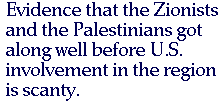 In Zunes's fantasy, all would be sweetness and light if it were not for the United
States: "U.S. policy has resulted in dividing Israelis from Arabs, although both are
Semitic peoples who worship the same God, love the same land, and share a
history of subjugation and oppression." But any evidence that the Zionists and
Palestinians got along well before U.S. involvement in the region is, shall we say,
scanty. As you see here, unlike a typical member of the Israel lobby Zunes portrays
Israel's adversaries as victims, not as evildoers; and therefore he can appeal to the
Left's Third World sympathies while simultaneously portraying Israel as a
victim.
In Zunes's fantasy, all would be sweetness and light if it were not for the United
States: "U.S. policy has resulted in dividing Israelis from Arabs, although both are
Semitic peoples who worship the same God, love the same land, and share a
history of subjugation and oppression." But any evidence that the Zionists and
Palestinians got along well before U.S. involvement in the region is, shall we say,
scanty. As you see here, unlike a typical member of the Israel lobby Zunes portrays
Israel's adversaries as victims, not as evildoers; and therefore he can appeal to the
Left's Third World sympathies while simultaneously portraying Israel as a
victim.
In Zunes's view the worst thing is to claim that the Israel lobby is responsible for any problems in the Middle East: "To blame the current morass in the Middle East on the Israel lobby only exacerbates animosities and plays into the hands of the divide-and-rule tactics of those in Congress and the administration whose primary objective is ultimately not to help Israel but to advance the American Empire."
 Zunes's apology for the Israel lobby is about as strong as it could
be for one still labeled a critic of Israel. After all, Zunes would like all mention of
the Israel lobby to cease. He believes that to be the essential precondition for peace
to take root. For those on the Left who prefer to live in a make-believe world,
Zunes has confected the perfect myth — victimized Arabs, victimized Jews,
and an ultra-evil American gentile economic elite. But since that state of things is
totally imaginary, it worsens rather than solves the real problems that exist; at least, it will not solve them in ways contrary to the goals set by the Israel
lobby. It will not provide for a viable Palestinian homeland. It will not stop
American military involvement in the Middle East. Quite obviously, if all critics
imitated Zunes and deliberately avoided any mention of the
Israel lobby's power, that lobby would flourish stronger than ever. [20]
Zunes's apology for the Israel lobby is about as strong as it could
be for one still labeled a critic of Israel. After all, Zunes would like all mention of
the Israel lobby to cease. He believes that to be the essential precondition for peace
to take root. For those on the Left who prefer to live in a make-believe world,
Zunes has confected the perfect myth — victimized Arabs, victimized Jews,
and an ultra-evil American gentile economic elite. But since that state of things is
totally imaginary, it worsens rather than solves the real problems that exist; at least, it will not solve them in ways contrary to the goals set by the Israel
lobby. It will not provide for a viable Palestinian homeland. It will not stop
American military involvement in the Middle East. Quite obviously, if all critics
imitated Zunes and deliberately avoided any mention of the
Israel lobby's power, that lobby would flourish stronger than ever. [20]
June 18, 2006
This article is © 2006 by Stephen J. Sniegoski. All rights
reserved.
This page is © 2006 WTM Enterprises. All rights
reserved.
Dr. Sniegoski's first essay on "The Israel Lobby":
"Israel lobbying: The attack
on Mearsheimer and Walt"
(April 20, 2006)
Dr. Sniegoski's second essay on "The Israel Lobby":
"The second wave against
Mearsheimer and Walt:
A well-tempered smother-out as a new war looms"
(May 25, 2006)
If you found this article to be interesting, please donate to our cause. You should make your check or m.o. payable in U.S. dollars to WTM Enterprises and send it to:
WTM Enterprises
P.O. Box 224
Roanoke, IN 46783
Thanks for helping to assure a future for TLD!
Notice to visitors who came straight to this document from off site: You are deep in The Last Ditch. You should check out our home page and table of contents.